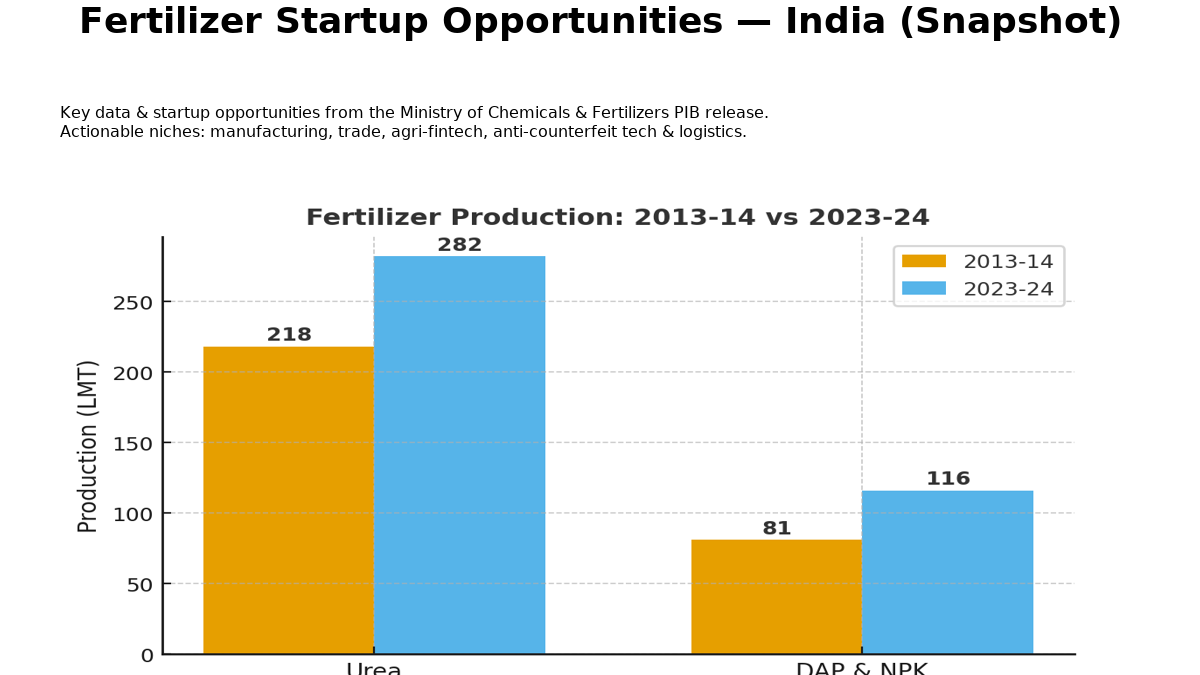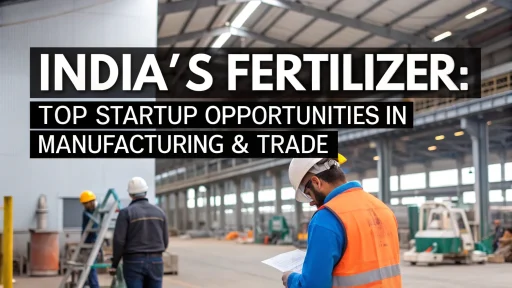Agriculture has been the backbone of India’s economy and fuels growth as its lifeline. Fertilizers are critical for food security and development; thus, their production and availability have been vital for India’s development. Recently, the Ministry of Chemicals and Fertilizers published updated PIB figures on fertilizer manufacturing, availability, and import trends, which indicate positive developments.
To many entrepreneurs and to-be startup founders, the figures published are more than just policy updates. They indicate growth in business opportunities in areas such as agritech, logistics, fintech, regulatory compliance, and sustainable alternatives. In this article, we analyze the latest government fertilizer report and provide actionable insights for businesses, drawing on the entrepreneurial journey of India’s self-made billionaires.

1. Enhanced Fertilizer Producing Facilities
The latest PIB release indicates remarkable growth in India’s domestic fertilizer production in the last decade.
- Urea production has more than doubled and is at 282 LMT, which is a 35% increase from 218 LMT in 2013-14.
- The production of DAP and NPK fertilizers has also seen a 44% increase from 81 LMT in 2013-14 to over 116 LMT in 2023-24.
- To some extent, revival of closed fertilizer plants under the Government’s initiatives and supported local manufacturing has reduced dependency on imports.
Opportunity for Startups: Support manufacturing IoT’s for fertilizer tracking, monitoring, and plant machinery.
Related: How to Start a Profitable Vermicompost Business
2. Imports of Fertilizers and Trade Partnerships
While the country has made investments to boost domestic capacity, imports are still fundamental. To aid in both supply and pricing, the government has made long-term import arrangements:
- 25 LMT import from Morocco under a 5-year agreement.
- 31 LMT DAP annually from Saudi Arabia starting 2025-26.
- Diversification of suppliers from Jordan, Oman, and Russia.
Opportunity for Startups: B2B marketplaces, supply chain tracking and blockchain, and trade compliance consultancy.
3. Fertilizer subsidy structure
The framework put into place with regards to the subsidy has guaranteed that they are accessible and affordable to all.
- Fixed price of urea is ₹242 for 45 kg bag.
- DAP is fixed at ₹1,350 and subsidies are in place to cover the cost.
- NBS scheme protects both the farmers and the subsidy.
Opportunity for Startups: Agri-fintech, distributor ERP, and forecast-powered data analytics.
View our Books on Biofertilizer, Biofertiliser, Biogas, Organic Farming, Vermicompost, Vermiculture,Biotechnology
4. Availability and Distribution in Kharif 2025
For kharif 2025, fertilizer is projected to be comfortable for availability in all regions.
Opportunity for Startups: Area-based shipment warehousing, AI-powered forecast, and advisory agritech apps.
5. Hoarding and Counterfeit Risks: Policy Enforcement
In the last few years, almost 200,000 inspections have been performed to eliminate hoarding, diversion, and black marketing of fertilizers.
Startups Opportunity: Anti-counterfeit packaging, compliance automation, RegTech, QR code counterfeiting, and blockchain traceability.
Related: The Rise of Bio Fertilizers and Organic Farming
Business Model Suggestions for the Fertilizer Ecosystem
| Business Idea | Description | Startup Model |
| Agri-Fintech Solutions | Develop platforms for subsidy management, credit facilities, and dealer financing. | SaaS + Lending |
| Fertilizer Supply Chain Analytics | AI tools predicting fertilizer demand, optimizing stock & transport. | B2B SaaS |
| Import-Export Trade Hubs | Digital marketplaces linking Indian distributors with global suppliers. | Platform Model |
| Sustainability Ventures | Organic & bio-fertilizer production reducing chemical reliance. | Manufacturing + D2C |
| Anti-Counterfeit Tech | QR/blockchain-based authentication for fertilizer packaging. | B2B Tech + Compliance |
Insight Global Trade: Using Data For Imports and Exports
Startups can fulfill niche needs like trade finance, fertilizer cargo logistics, and export of agri-inputs to neighboring countries with long-term import contracts.
For more information, check out this related video
Takeaways of Indian Business Tycoons
- Age is no barrier for entrepreneurship, as exemplified by Falguni Nayar, who built her beauty brand Nykaa into a unicorn.
- Mobility and AI crossover Ola and Krutrim showcasing scalability and vision by Bhavish Aggarwal.
- Flipkart’s Binny Bansal grew a $6,000 startup to India’s most valued e-commerce company.
- Sunil Bharti Mittal (Airtel) – Developed and expanded a telecom empire catering to over 500 million customers.
- Uday Kotak (Kotak Mahindra Bank) – Established and grew to be one of India’s largest private sector banks.
NPCS: Opportunity to Feasibility
At NPCS, we prepare Market Survey cum Detailed Techno-Economic Feasibility Reports (DPRs). These reports comprehensively document the processes of manufacturing, the estimation of the market demand, the planning of the plant capacity, the listing of the required machinery and suppliers, the complete assessment of the financial viability, and all these processes are undertaken in detail.
Find the Best Idea for Yourself With our Startup Selector Tool
Conclusion
India’s fertilizer production boom, import partnerships, and subsidy frameworks are not just policy changes; they are also frameworks for new business opportunities for startups. India’s growing and highly successful tycoons are focusing on capturing the emerging trends, solving fundamental problems and scaling business using innovation.
References
• Ministry of Chemicals & Fertilizers, Government of India. Press Release ID: 2159809. pib.gov.in
• Entrepreneurial insights from Economic Times, TOI, and public biographies of Indian business leaders.







